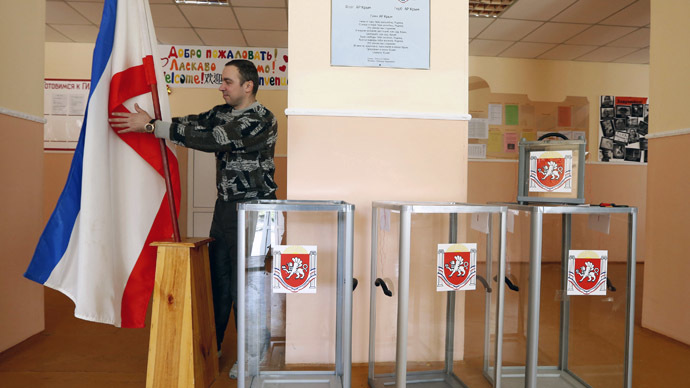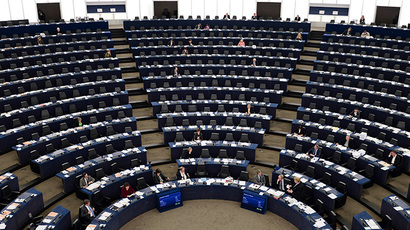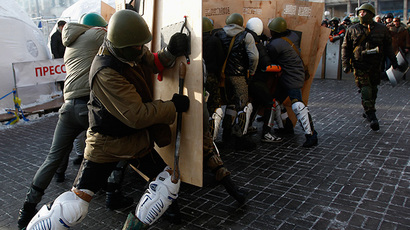Crimea ‘calm’ ahead of referendum – intl observers

No tensions in Ukraine’s autonomous republic of Crimea were reported by the team of international observers Saturday, as they started monitoring polling stations and readying for the crucial vote on the peninsula’s independence.
Thirty observers, who come from 10 European nations, have arrived in Crimea at the invitation of the republic's election commission and have already started their work, Mateusz Piskorski, the director of the European Geopolitical Analysis Centre and the mission coordinator, said.
“At the moment we are starting to monitor the preparation of polling stations. In general, the situation is very calm, there is no tension,” he told Interfax news agency. “Everyone hopes there will be no provocations."
Members of the mission come from Poland, Austria, France, Germany, Belgium, Bulgaria, Hungary, Greece, Italy and Latvia. Representing the European Democracy and Election Monitoring Institute (Brussels), they are deputies from the European parliament, members of national parliaments of their native countries, as well as leading European international law experts and famous human rights activists.
However, not for everyone the upcoming vote could be viewed as outright peaceful.
Finnish human rights activist Johan Backman revealed to Channel 1 he had received a letter with death threats, just because he was travelling to Crimea as an international observer.
“Russophobic hysteria over the Crimea referendum is everywhere, all Western authorities are against it, and all say that it’s a violation of the international law. But have a look at Kosovo, Scotland and Catalonia, etc. – Russians also have a right to determine their future, where they want to live, as a part of Russia or as they wish.”
The legality of the Crimea referendum wasn’t questioned by Luc Michel, a Belgian political activist, who came to Crimea on an observer mission.
“The separation of Kosovo didn’t violate the norms of international law. The situation in Crimea is really similar to it, so why what was good for Kosovo is bad for Crimea?” he told journalists Saturday.
Having arrived at the Simferopol airport safe and sound, the international observers have shared their views on the situation in Crimea.
The Latvian representative of the EU Russian-speakers Alliance, Miroslav Mitrofanov reaffirmed the situation in Crimea is calm.
“The [Simferopol] airport is more demilitarized than Strasbourg railway station,” he pointed out.
Mitrofanov also said all TV stations function in Crimea: “There is no blockade of the Ukrainian media”.
At a news conference, held on Saturday evening, Mateusz Piskorski clarified that the mission he is heading is of a short-term character. “It is based on the OSCE methodology” and is comprised of “independent observers from NGOs”, whose mission is to visit 10-15 per cent of all polling stations of the Autonomous Republic and to communicate with Crimean observers. The sole problem of the popular vote he named was the fact that the Ukrainian military has no access to vote, as it is prohibited by the Kiev government.
Along with other international observers, an American foreign affairs analyst of Serbian origin, Srdja Trifkovic called the Crimean referendum “legal and legitimate, democratic and right”. He named the attitude of the White House that insists that Crimea must remain a part of the Ukraine, “highly ironic”.
The referendum vote in Crimea takes place this Sunday, March 16 – with two vital questions. That is, Crimea will decide whether to join Russia or to remain an autonomous region in Ukraine, reinstating the 1992 Constitution of the autonomous republic.














